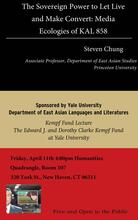“The Sovereign Power to Make Live and Let Convert: Media Ecologies of KAL 858”
The narrative of Kim Hyǒn-hǔi’s conversion fit squarely within the discourses of the Cold War and her pardon was exercised within the sovereign rights of the president. But amidst the tensions beginning to shake the discursive regime that had dominated throughout postwar developmentalism, conversion and sovereignty were no longer hegemonic conceptual and institutional forces. In the dynamic early stages of the transition from military authoritarian rule to globally contingent neoliberal governance, the sovereign power to make live and let convert needed legitimation. But it was not only the political system that was beginning to change. Rather, the whole technological apparatus through which communication occurred—marked by the ascendancy of television and the reorientation of the media ecology around it—was undergoing radical transformation. Sovereign power could only be exercised through the exploitation of the discursive grammar and technological affordances of the new media. This talk traces that uneven and unstable process, explores how it reflects on the media themselves, and then considers how these logistics of conversion resulted in excesses and fissures that are reflected in today’s media crises.
